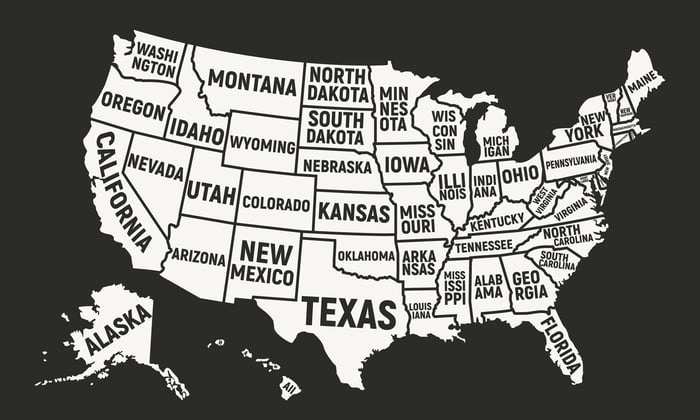For many older Americans, Social Security keeps them afloat. Roughly half of married couples say that it makes up at least 50% of their income, according to the Social Security Administration (SSA), and two in five couples say they rely on their benefits for at least 90% of their retirement income.
If you’re going to depend on your monthly checks to pay the bills, it’s crucial to understand how taxes will affect you. Based on where you live, you may be subject to taxes on your benefits at both the state and the federal levels.
Not all states tax Social Security, though, so you may be able to keep more of your benefits if you retire in one of these places.
 States that don’t tax benefits
States that don’t tax benefits
Most states have slightly different laws surrounding how income is taxed, but in these 37 states, you won’t pay state tax on Social Security benefits:

Seven of these states (Alaska, Florida, Nevada, South Dakota, Texas, Washington, and Wyoming) don’t have any state income taxes, and Social Security benefits fall into that category.
Other states do have income tax, but only on investment income and dividends.
The majority of states, though, charge income tax but have exceptions for Social Security income.
Also, while Illinois doesn’t tax Social Security benefits, that could change.
It is not in the best shape financially (to put it mildly), and some groups think that by taxing Social Security, it could improve its financial situation.
Nobody knows how that will play out, but if you’re an Illinois resident and close to retirement, keep an eye on it to see how your benefits might be affected.
Living tax-free in retirement? Not so fast
Even if you live in one of these 37 states, you’re not exempt from federal taxes. Not everyone has to pay federal taxes on their benefits; it depends on your income. But that income threshold is so low, most people will pay some tax on Social Security benefits.
The SSA uses what it calls your “combined income” to determine your federal tax bill. Your combined income is half your total benefit amount for the year, plus any other retirement income. So, for instance, if you’re receiving $18,000 per year from Social Security and have an additional $30,000 in other retirement income, your combined income is $9,000 plus $30,000, or $39,000.
Depending on your combined income, you may need to pay tax on a portion of your benefits:
 So, in the example above, if you’re filing taxes as an individual and your combined income is $39,000 per year, you’ll pay federal tax on 85% of your benefits. No matter how much you’re earning, you won’t pay tax on more than 85% of your benefits. And if you earn less than $25,000 per year (or $32,000 for married couples), your benefits won’t be taxed at all.
So, in the example above, if you’re filing taxes as an individual and your combined income is $39,000 per year, you’ll pay federal tax on 85% of your benefits. No matter how much you’re earning, you won’t pay tax on more than 85% of your benefits. And if you earn less than $25,000 per year (or $32,000 for married couples), your benefits won’t be taxed at all.
Minimizing taxes in retirement
If you’re considering moving to a more tax-friendly state in retirement to save some money, that’s not necessarily a bad idea. But taxes are just one part of the big picture in retirement. Consider how moving to a different state would affect your overall cost of living.
For instance, what are the property taxes in your prospective new state? How much will it cost to rent or buy a home? If you move, will you be spending more on travel to visit friends and family? Weigh all the pros and cons of moving to see if the tax advantages outweigh the costs.
When you’re depending on Social Security to make ends meet, paying taxes on benefits can throw off your retirement plan if you don’t factor them into your budget. The more you understand about taxes, the better off you’ll be.
— Katie Brockman
Where to Invest $99 [sponsor]Motley Fool Stock Advisor's average stock pick is up over 350%*, beating the market by an incredible 4-1 margin. Here’s what you get if you join up with us today: Two new stock recommendations each month. A short list of Best Buys Now. Stocks we feel present the most timely buying opportunity, so you know what to focus on today. There's so much more, including a membership-fee-back guarantee. New members can join today for only $99/year.
Source: The Motley Fool



